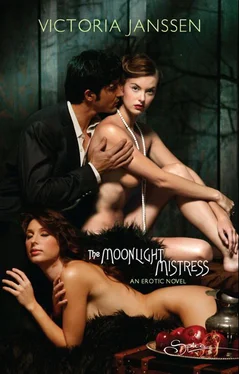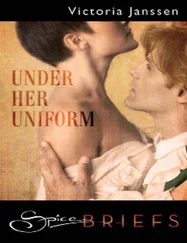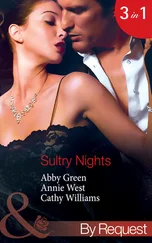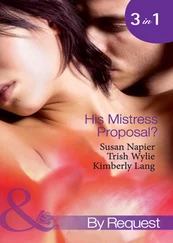A slow smile stole across his face. “You are a paragon among women.”
Lucilla patted his shoulder and handed him his hat. “Where does Herr Kauz live? In the town, I hope.”
“It’s not far.”
Pascal carried the pistol in his jacket pocket, his uninjured hand tucked in on top of it. She’d suggested a sling for his other arm but he’d said it would be too conspicuous. He’d abandoned his trunk and stuffed a few items into his rucksack. Lucilla carried her carpetbag, with his rucksack slung over her back. Herr Kauz lived only two streets over from the Institute, in a brick house that looked far more pleasant than its owner, with fat red flowers growing in pots to either side of the front door. A plump woman in a servant’s uniform pinned wet trousers to a line in the side garden. Lucilla could see the motor, an open two-seater model, parked just beyond.
“Wait here,” Pascal said, stopping in the shade of an elm. It overhung the corner of a neighboring house’s front garden, and would provide good concealment.
Lucilla desperately wanted to go with him, not because she felt it wise, but because she felt more exposed standing in the street than she had the night before in their bed. She set her carpetbag on the grass and crossed her arms, to prevent herself from reaching for him. She was a middle-aged woman who had traveled to a foreign country to perform research, not a green girl who couldn’t let her lover out of her sight. “Go,” she said.
She watched as Pascal strode off down the street. He followed a neat brick path to Kauz’s door and rapped the knocker. She could not see who answered, but he was admitted. She bent and fiddled with the hooks on her shoes, feeling excessively visible again. She was sure many pairs of eyes burned through her back and could sense lace curtains being twitched aside all along the street.
She amused herself by imagining explanations for her presence. She was Pascal’s mother, and he the illegitimate son of Kauz. She was a spy. She had been sent by the German government to check their readiness to deal with foreign spies. She was selling scientific glassware, door to door. She watched Kauz’s housekeeper finish with the laundry, pick up a basket and go inside by a rear door, letting it slam behind her. Lucilla stared at the motor, thinking.
Pascal emerged. He did not turn toward the side garden, but walked quickly toward her, his shoulders rigid. He ducked behind the tree’s trunk and swore.
“Stay calm,” Lucilla said. She picked up her bag and handed him his rucksack. “The servant went inside. We’ll walk to the motor now. There’s no crank, it must have a self-starter.”
“He refused.”
“Then we commandeer his vehicle. Isn’t that the word? You know how to start the engine, don’t you? I can do it if you don’t know how.”
Pascal only hesitated a moment before seizing her arm and walking back toward Kauz’s home.
“Not too quickly,” Lucilla murmured. “We must behave as if we have every right.”
“He will hear the engine.”
“There’s a clear path from his garden to the street. We must be quick. Do you know where he is in the house?”
“He returned to his library.”
Laughter gurgled in the upper region of Lucilla’s chest as she ducked beneath damp shirttails fluttering in the summer breeze. Pascal pushed his way through a sheet. She would never have dared this on her own, would never have entertained such desperate measures had the night not changed her entire idea of herself. She would never have imagined that stealing a motor could be such a thrill.
She laid her carpetbag gently in the rumble seat, took Pascal’s rucksack and laid it in, as well. Pascal quietly opened the door; he fiddled with the spark and throttle levers while she arranged herself to block him from view and kept a wary eye out. He looked at her beneath his arm. “When the engine catches, be ready. You must drive.”
Lucilla nodded and gathered her skirts into her hands. The engine roared and Pascal threw himself onto the seat, sliding across. She followed, remembering to release the hand brake before she slammed the door and sent the motor into high gear. She hadn’t driven in over a year. “It’s like cycling,” she said to herself, turning onto the street. Behind them, she heard banging doors and shouting. She gave the motor more petrol, and soon the shouting faded. It was satisfying to drive faster than Kauz could run. She hoped he’d seen her. He could add thief to whore, she thought with savage glee.
The Institute’s gates were still shut. As they neared the more populous areas of the town, she tried to look as if the motor belonged to her. Surely someone would recognize it. But if they did, they were too concerned with their own business to take note of who occupied the seat. They passed the train station’s brick facade. The shaded porch was even more crowded than the day before, and there was no sign of trains. She glanced at Pascal, who slouched in the seat next to her, cradling his arm. “Do you have a map?”
He shrugged. “In my head.”
They motored past the town’s medieval walls and were suddenly surrounded by countryside. The summery smell of grain blew in Lucilla’s face. She would have to see if Kauz kept goggles in the glove box. For now, her hat would have to serve as protection. “Can you get us to France?”
“If no one shoots us, and we do not run out of petrol.”
“I’d forgotten about petrol,” she admitted. “It’s a pity motors can’t eat grass.”
“Perhaps in the next town they will be willing to sell us some.”
“I’ll be helpless,” Lucilla decided. “My children are waiting for me.”
“You have children?” Pascal asked abruptly.
“Not a one, but I’ll pretend if necessary. You?”
“Of course not! I am not married.”
Lucilla laughed. Unless she had amnesia about the event, he was not married to her, but that had not stopped him from making love to her for most of the night.
He seemed to hear her thoughts. “That was different!”
Lucilla continued to laugh. He sounded younger with every protest. At last she said, “I’m laughing in relief, I think.”
“We aren’t safe yet.”
“We’ll proceed one step at a time,” she said, thinking of chemistry experiments.
“Perhaps if we run out of petrol, we can sell the motor and buy a cart,” he said.
“That’s a good plan.”
“I would sell this motor now for coffee and croissants.”
Lucilla’s stomach growled in agreement. “I forgot about that sort of fuel, too.”
“You were fed by criminal instinct,” Pascal suggested. She glanced at him, and he was grinning. “This could be easier if you stayed in France. With me.”
Excitement leaped in her chest. She took a deep breath. “In the middle of a war.”
“England will soon declare war. This may have happened already. We did not see the papers, as we did not have coffee and croissants.”
Her empty stomach fluttered, and she felt short of breath. “I have to go home. My brother, Crispin, is a reservist. He might be called up. If there’s fighting, they’ll need nurses.”
“You could nurse for France, if you desired. Or you could work as a chemist.”
“I’m sure France would look on that as kindly as England does,” she said. “I already don’t like being a foreigner alone among foreigners in a country at war, and that’s how it would be for me.” When he said nothing, she added, “If I don’t return now, I might not get the chance later. I don’t want to be away from my family in a crisis.”
“They cannot endure this crisis without you?”
“It’s not a matter of—think of sheep huddling together.”
“You are not a sheep. Not in the least.”
Читать дальше












